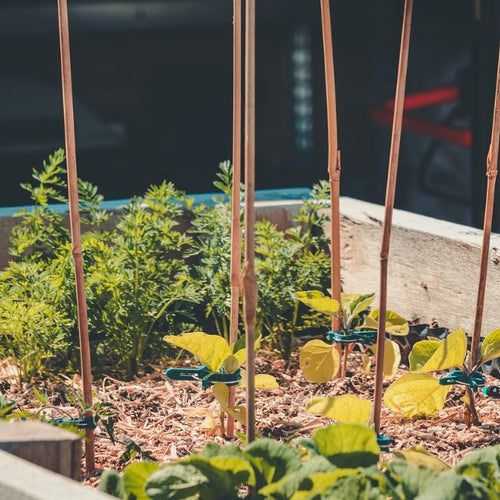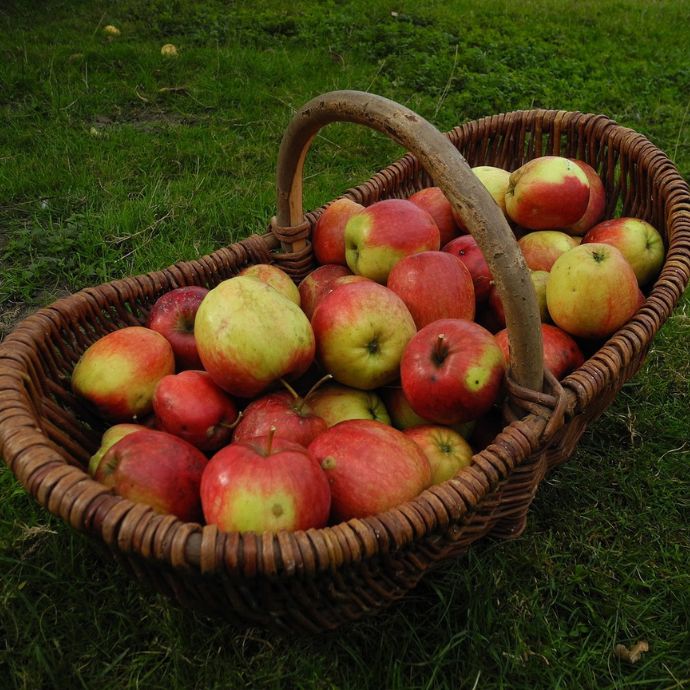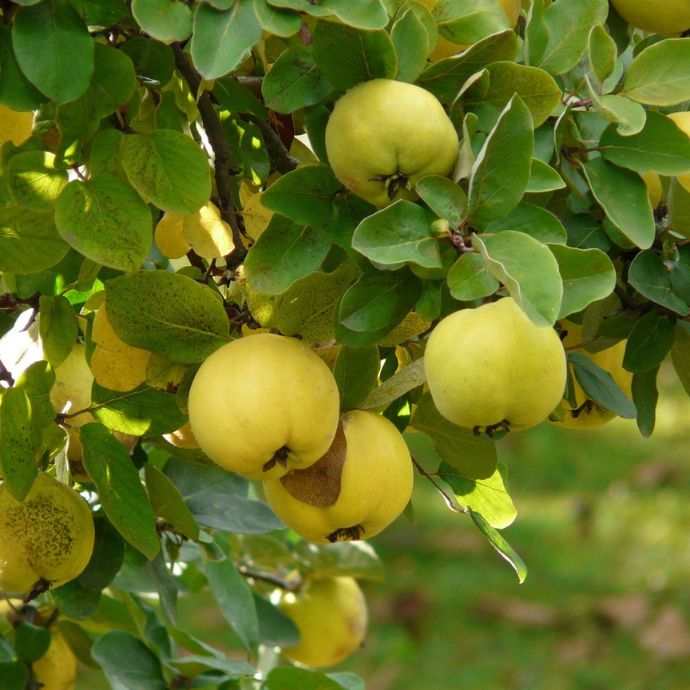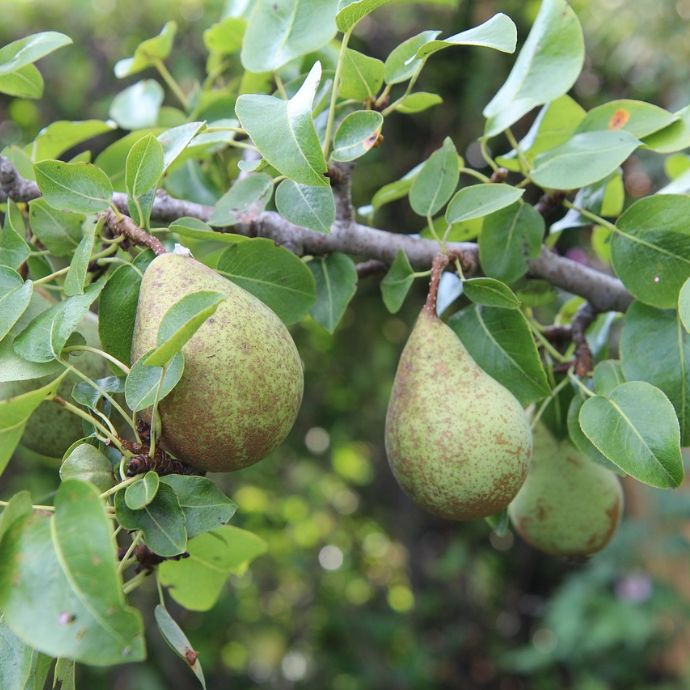Advice & Inspiration
Benefits of Blueberries: Should You Grow Your Own?

Blueberries are a relatively recent introduction to the UK, having made the journey from North and South America in the 1930s. An expensive import at first, they gained popularity after blueberry farms were established over here and now they can be found in everything from smoothies to pancakes and of course in the ubiquitous blueberry muffin. The blueberry really had a moment in the 1990s when it was touted as a ‘superfood’, and since then all kinds of outlandish health claims have been made for them. Grab a handful of this popular summer fruit to snack on (see disclaimer below) as I attempt to demystify the health benefits of blueberries.
Jump to:
How healthy are blueberries?
Blueberries are made up of 84% water, 14% carbs (including sugars) and a little bit of protein and fat. We’re told it’s good for our overall health to eat a rainbow of fruit and vegetables, with blue or purple foods providing antioxidants from their anthocyanin pigments. The lab evidence for this is a little shaky, but what is certain is that blueberries contain a lot of important nutrients.
Vitamins and minerals in blueberries
100g of blueberries contain approximately the following proportions of your recommended daily amounts of vitamins and minerals.
Blueberry vitamins
- Vitamin A: 2%
- Vitamin B1: 2%
- Vitamin B2: 2%
- Vitamin B3: 2%
- Vitamin B5: 1%
- Vitamin B9: 2%
- Vitamin C: 16%
- Vitamin E: 4%
- Vitamin K: 24%
Blueberry minerals
- Calcium: 1%
- Iron: 2%
- Potassium: 2%
- Magnesium: 2%
- Phosphorus: 1%
- Zinc: 1%
- Copper: 3%
- Manganese: 17%
Blueberry nutrition
Your 100g serving of blueberries contains just 57 calories. That does go up slightly (to approx. 313) if you encase them in a muffin, though. The main benefits of blueberries come from their high levels of vitamins C and K, and manganese, which have a beneficial effect on general health and in particular on the immune system, bone health and blood clotting.
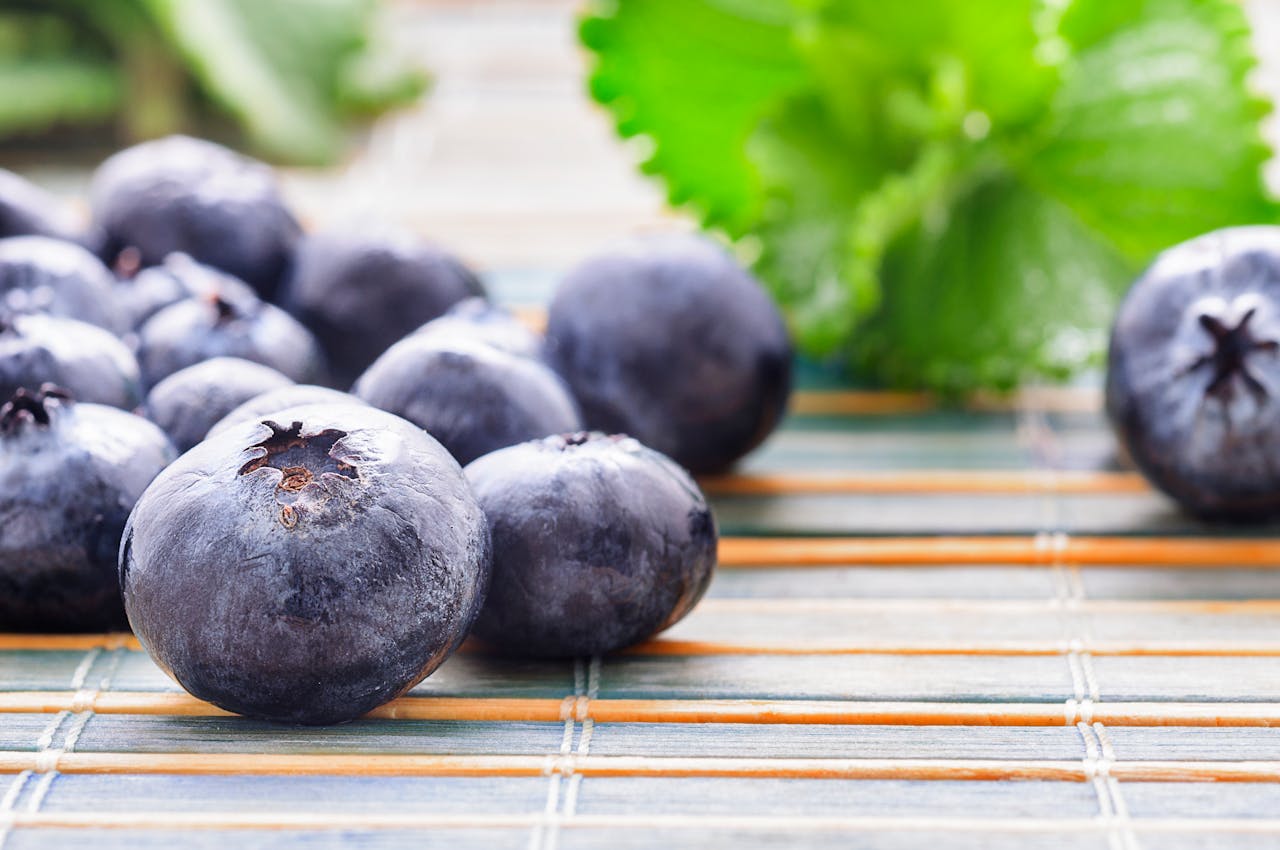
Are blueberries high in sugar?
Blueberries contain about 10g sugar per 100g, as equal parts fructose and glucose - a level similar to an apple. This is higher than other berries such as raspberries (4.4g) or strawberries (4.9g) but still not high enough to cause concern. They have a fairly low GI (glycemic index) score of 53 though, meaning that they won’t cause major blood sugar spikes and so are considered safe for diabetic people. If you are watching your sugar intake, you may want to avoid dried blueberries though, as having the water removed means that their sugar content is an eyebrow raising 69g.
Blueberries are good for your heart
Eating a wide range of different fruits and vegetables is a factor in lowering cholesterol levels and improving your heart health, and berries are thought to be particularly good at this, thanks to their high polyphenol content. Blueberries are rich in antioxidant compounds and fibre, both of which contribute to better general health.
Blueberries are good for your brain
In a study carried out jointly by King's College London and the University of Reading, the results seemed to suggest that consuming blueberries can improve brain function. Participants in the study who consumed blueberry powder over twelve weeks showed better memory and mental flexibility than those in a control group, and this was believed to be due to the anthocyanin content of the blueberries.
However, you should take these claims with a small pinch of salt, as the study was funded by the Wild Blueberry Association of North America. Research into the health benefits of blueberries is still ongoing.
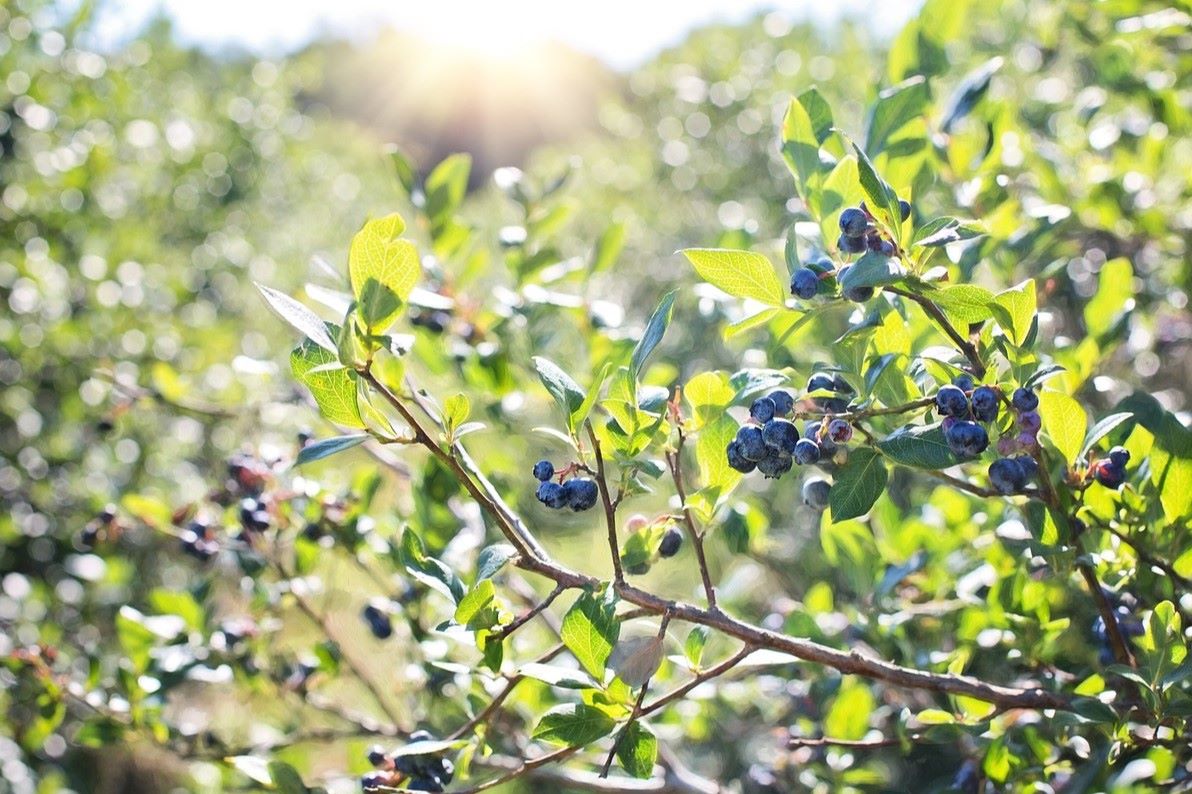
Are blueberries a superfood?
When the idea of ‘superfoods’ was first popularised in the 1990s, blueberries were right up there at the top of the list with kale and chia seeds. But were they really superior to any other berry? Not really.
It all originated with a marketing agency in the U.S. who picked up the fact that blueberries are high in antioxidants and ran with it. Other food producers jumped on the bandwagon and the term ‘superfood’ started to be splashed across all manner of packaging.
Was this a bad thing? Not entirely. The foods promoted, including kale, chia, avocados and goji berries, are all healthy foods that benefit human health. What was not so beneficial was where it was implied that these foods were better than other fruit, vegetables and seeds. Nutritionists started to speak out against the ‘superfood’ label as they felt it was encouraging people to eat a narrower range of foods, focused only on those labelled ‘super’. As the idea fell out of favour, the word ‘superfood’ began to discreetly disappear from packaging. It’s now widely accepted that the healthiest diet is one that’s rich in as many different fruits and vegetables as possible - including blueberries.
Are pink blueberries just as healthy?
Yes, pink blueberry varieties like Pink Lemonade have a similar vitamin and mineral content to their blue counterparts, providing the same benefits in terms of vitamins and minerals, fibre and antioxidants.
Are cooked blueberries still good for you?
Cooking will reduce the vitamin content of your blueberries, but the good news is that it seems the polyphenol content and fibre stay at around the same level. The best way to make sure you get your blueberry nutrients is to enjoy a mixture of raw and cooked fruits. I mean even if you cook them to death, they’re still healthier than a packet of pork scratchings.
How many blueberries should you eat in a day?
Two handfuls (or four heaped teaspoons) of blueberries count as one of your five a day, but you can’t really have too much of this healthy fruit. Unless you’re allergic to it of course.
Disclaimer: blueberry health warning
Although blueberries are a healthy food for most of us, the same can’t be said for those people with a salicylate allergy or intolerance. Salicylates are a chemical that fruits make to protect themselves against pests and diseases, and blueberries contain high levels. If you experience symptoms such as a rash, wheezing, swelling or stomach upset after eating blueberries, you should probably avoid them, seek medical advice and bake some choc chip muffins instead.
If you’re taking a blood thinning medication such as warfarin, you should also go easy on the blueberries. They are rich in vitamin K, which in large amounts can aid blood clotting.
Finally, you should avoid any experimental chewing gum developed by a maverick chocolatier which promises to deliver a three course meal ending in blueberry pie. Just ask Violet Beauregarde.
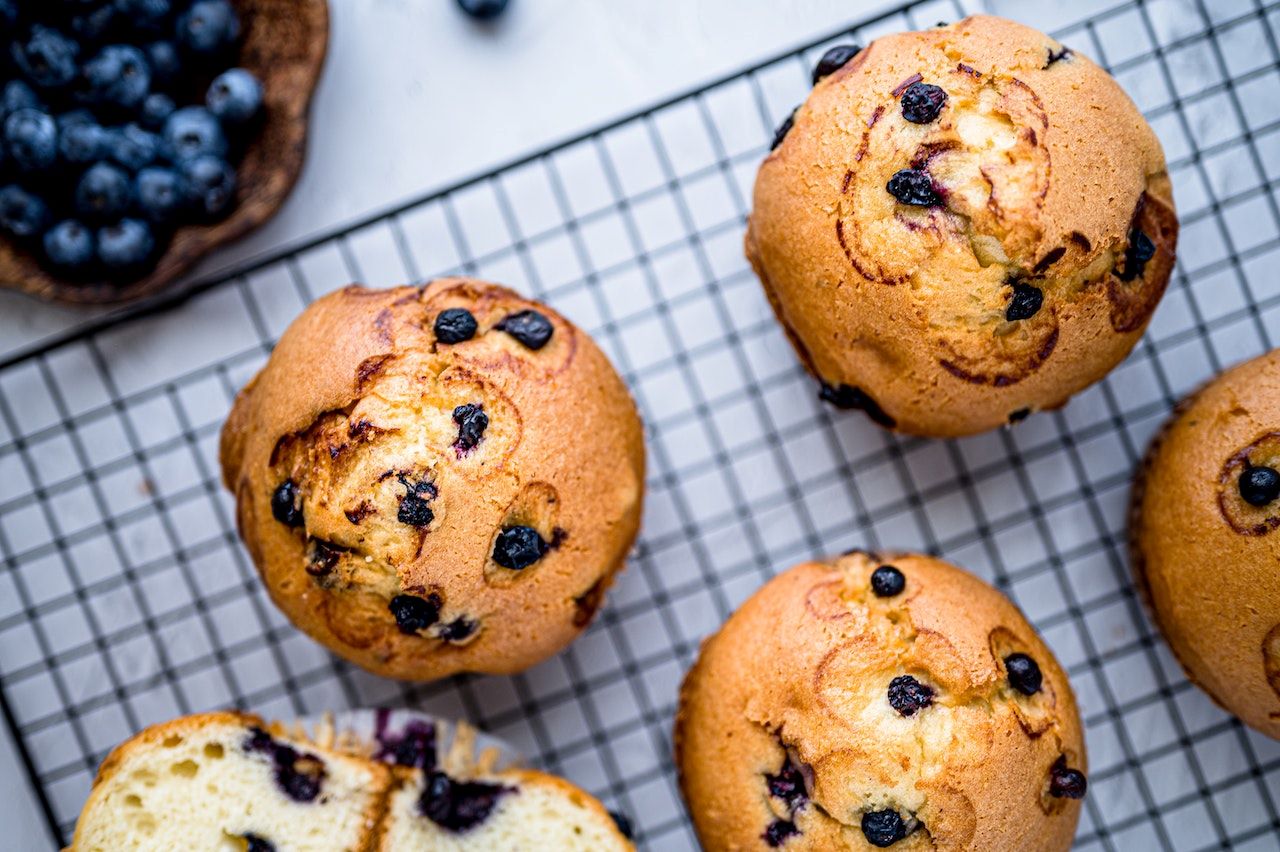
Are blueberry plants good for wildlife?
Blueberry plants have pollen and nectar rich flowers and are on the RHS Plants for Pollinators list for their value to bees, butterflies and other insects. You may not be so glad to know that birds are attracted to blueberries - they’re a particular favourite with robins and starlings! If you’d rather keep your blueberry crop for your pancakes, you can cover the plants with fine netting as they start to ripen.
Are homegrown blueberries healthier?
We can all agree that blueberries are a healthy food, but is it better to grow your own? Are there any nutritional differences?
Good for you
When you pick a berry from the plant, the vitamin content starts to go down. The sooner you eat it, the higher the health benefits for you, so you naturally want your produce to be as fresh as humanly possible. Growing your own blueberries means that you can eat them within minutes, not weeks. They’ll also taste sweeter, as commercially grown berries are picked when slightly unripe so that they’ll last longer. Yours will be full of properly ripened, well developed fruit sugars as well as warm from the sun. There’s really no better way to eat them! Of course your homegrown crops won’t be covered in pesticides either.
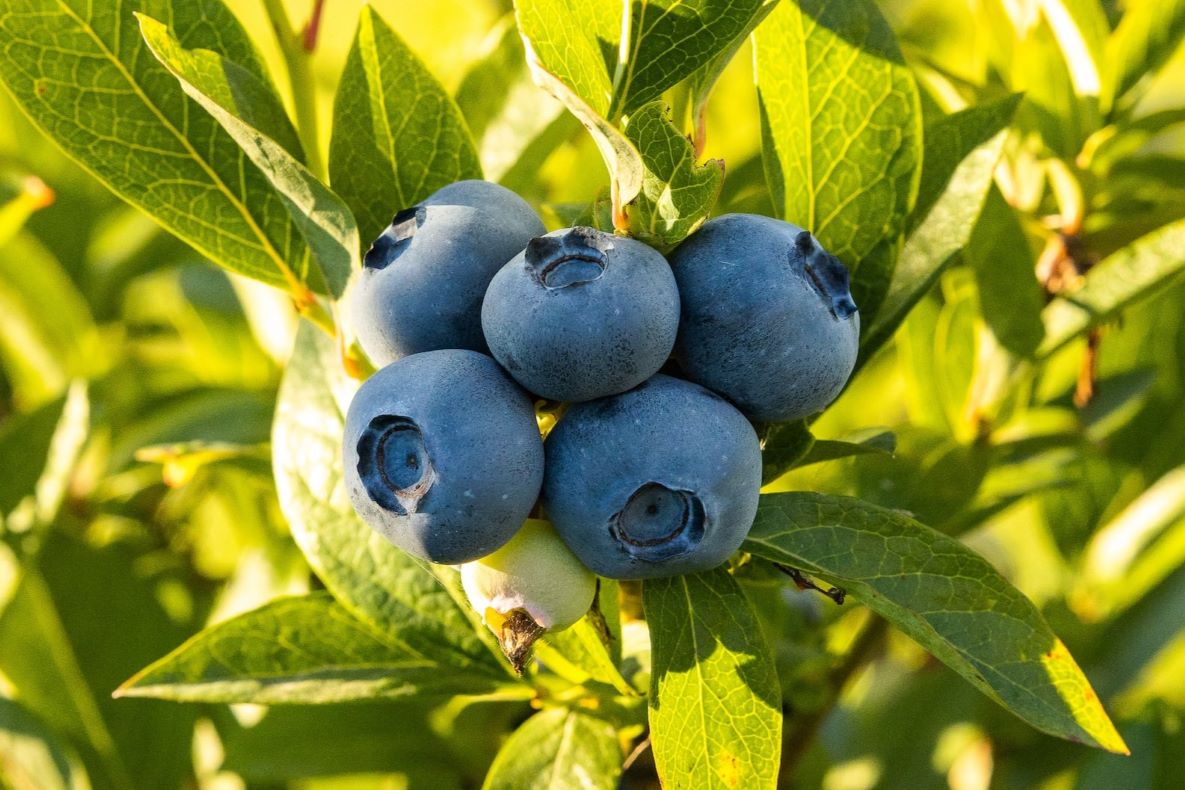
Great for your garden
In addition to being good for you, blueberry plants are great for your garden. They look lovely, thrive in pots and don’t grow too big, so you can plant them even in the smallest spaces (be sure to use ericaceous compost or acidic soil though). These attractive plants flower in late spring and bring pollinating insects to your garden, so they’ll benefit all your other plants too. Some are even evergreen - such as Sunshine Blue - so you can enjoy them all year round.
Better for the planet
When you buy blueberries from a shop, they might have been imported from Argentina, Spain, the Netherlands, South Africa, Uruguay or elsewhere, usually by air. By growing yours in your backyard, you can help to reduce the environmental impact of importing blueberries, turning food miles into food footsteps and also reducing the use of single use plastics as packaging.
Inspired to give it a go? Check out our blueberry growing guide.